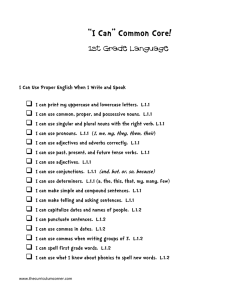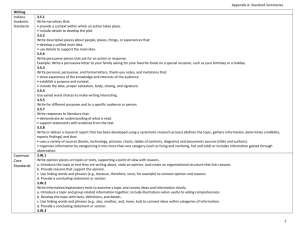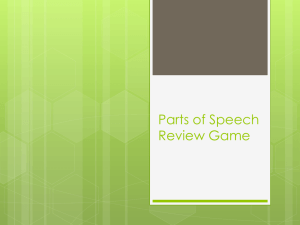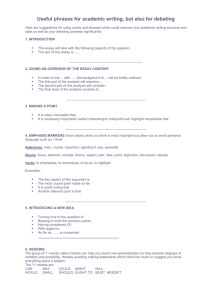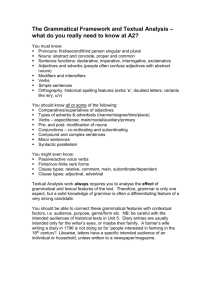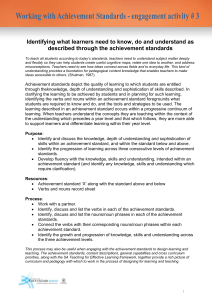Document 14013162
advertisement
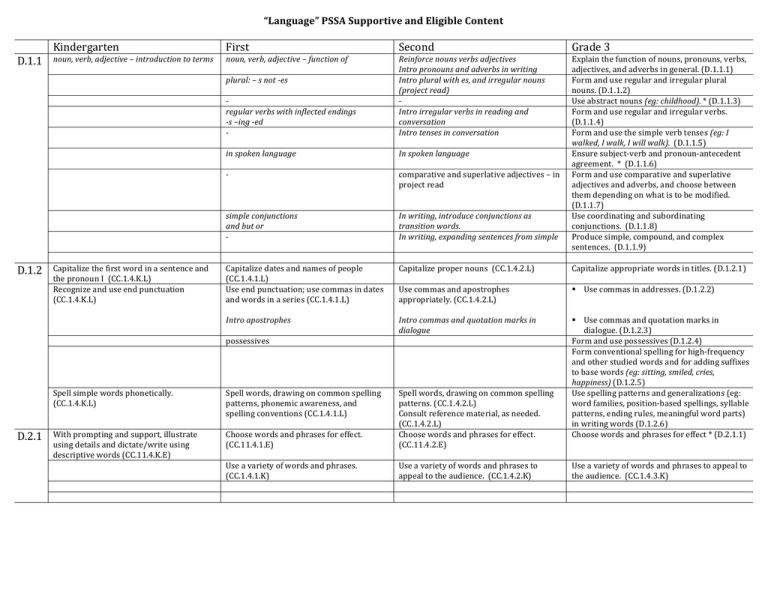
“Language” PSSA Supportive and Eligible Content Kindergarten First D.1.1 noun, verb, adjective – introduction to terms noun, verb, adjective – function of plural: – s not -­‐es -­‐ regular verbs with inflected endings -­‐s –ing -­‐ed -­‐ simple conjunctions and but or -­‐ In writing, introduce conjunctions as transition words. In writing, expanding sentences from simple Capitalize the first word in a sentence and the pronoun I (CC.1.4.K.L) Recognize and use end punctuation (CC.1.4.K.L) Capitalize dates and names of people (CC.1.4.1.L) Use end punctuation; use commas in dates and words in a series (CC.1.4.1.L) Intro apostrophes Capitalize proper nouns (CC.1.4.2.L) possessives Spell simple words phonetically. (CC.1.4.K.L) Spell words, drawing on common spelling patterns, phonemic awareness, and spelling conventions (CC.1.4.1.L) With prompting and support, illustrate using details and dictate/write using descriptive words (CC.11.4.K.E) Choose words and phrases for effect. (CC.11.4.1.E) Spell words, drawing on common spelling patterns. (CC.1.4.2.L) Consult reference material, as needed. (CC.1.4.2.L) Choose words and phrases for effect. (CC.11.4.2.E) Use a variety of words and phrases. (CC.1.4.1.K) Use a variety of words and phrases to appeal to the audience. (CC.1.4.2.K) Explain the function of nouns, pronouns, verbs, adjectives, and adverbs in general. (D.1.1.1) Form and use regular and irregular plural nouns. (D.1.1.2) Use abstract nouns (eg: childhood). * (D.1.1.3) Form and use regular and irregular verbs. (D.1.1.4) Form and use the simple verb tenses (eg: I walked, I walk, I will walk). (D.1.1.5) Ensure subject-­‐verb and pronoun-­‐antecedent agreement. * (D.1.1.6) Form and use comparative and superlative adjectives and adverbs, and choose between them depending on what is to be modified. (D.1.1.7) Use coordinating and subordinating conjunctions. (D.1.1.8) Produce simple, compound, and complex sentences. (D.1.1.9) Capitalize appropriate words in titles. (D.1.2.1) In spoken language D.2.1 Grade 3 Reinforce nouns verbs adjectives Intro pronouns and adverbs in writing Intro plural with es, and irregular nouns (project read) -­‐ Intro irregular verbs in reading and conversation Intro tenses in conversation in spoken language -­‐ D.1.2 Second comparative and superlative adjectives – in project read Use commas and apostrophes appropriately. (CC.1.4.2.L) Intro commas and quotation marks in dialogue § Use commas in addresses. (D.1.2.2) § Use commas and quotation marks in dialogue. (D.1.2.3) Form and use possessives (D.1.2.4) Form conventional spelling for high-­‐frequency and other studied words and for adding suffixes to base words (eg: sitting, smiled, cries, happiness) (D.1.2.5) Use spelling patterns and generalizations (eg: word families, position-­‐based spellings, syllable patterns, ending rules, meaningful word parts) in writing words (D.1.2.6) Choose words and phrases for effect * (D.2.1.1) Use a variety of words and phrases to appeal to the audience. (CC.1.4.3.K)
